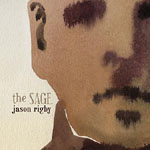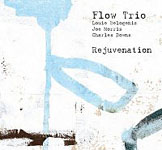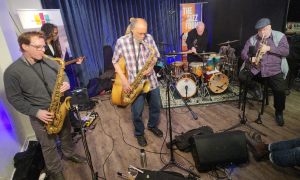Home » Jazz Articles » Live Review » The Jazz Mandolin Project at Club Metronome
The Jazz Mandolin Project at Club Metronome
The intelligence and joy radiated by The Jazz Mandolin Project deserve to be as widely shared as possible...
Club Metronome
Burlington, Vermont
February 20, 2009
On the second of just two stops within their northeast home base, The Jazz Mandolin Project, led by Jamie Masefield, played like a finely-tuned unit of musicians who had spent weeks on the road. Noticeable right from the start, the high-quality sound in Burlington Vermont's Club Metronome was a harbinger of things to come as the fidelity continued full and clear throughout the three-hour performance, the arresting sound a direct reflection of the musicianship itself.
Opening with a comparatively short run through the original "Flux," Masefield and company then spent an extended time testing their instincts individually and collectively for approximately forty minutes. They moved virtually flawlessly from another self-composed piece called "Spiders" on to "Swing Gitan" by Django Reinhardt. That piece found its counterpart in the second set with Miles Davis' "Milestones," the hard-boppin' likes of which JMP navigated equally deftly as the composition of the famed Belgian guitarist.
Those stylistic touchstones lay at the heart of Masefield's innovative concept for his Jazz Mandolin Project and, as such, gives the lie to the journeyman demeanor he usually exhibits on stage. Not that he doesn't clearly enjoy himself, but his concentration comes at the expense of too much stage patter—except to introduce the band like personal friends to share with the audience.
And that makes a certain amount of sense given the fact a mandolin is hard to wield—like a conductor's baton. Accordingly, quick, virtually indiscernible asides to Masefield's partners signaled changes in key and rhythm, and assured smooth segues from tune to tune. This continuity enabled bassist Scot Ritchie to prod and propel the quartet besides maintaining a pulse in time with Jon Fishman; on break from rehearsals for Phish's return to the stage, the drummer took it upon himself to fill spaces or lock in with his rhythm partner to alternately emphasize a groove or initiate a new one.
A boon to the group's versatility, Peter Apfelbaum played fluid saxophone lines to shore up the JMP connection to traditional jazz, turned to percussion often enough to bring out the world music element of the JMP sound, as on "Baobab Tree" and, less frequently but equally crucially, stepped over to an electric keyboard. Thus the varied textures of sound combined to lend diversity to the music as varied as the demographics of the attendees and, more significantly, the choice of material.
The Led Zeppelin medley of "Going to California" coupled with "What Is and What Should Never Be" was as pure and understated as anything Jazz Mandolin Project played this cold Vermont night. By contrast, the multiple melodic embellishments Masefield's mandolin launched within Neil Young's "Powderfinger" brought a sweet grandeur to the funky room, while the ear-catching progression of Sonny Rollins' "St. Thomas" conjured up a tropical atmosphere all too inviting (not to mention comforting) this time of year for the residents of the Green Mountains.
The intelligence and joy radiated by The Jazz Mandolin Project deserves to be as widely shared as possible, and there could hardly be a performance more ripe for recording and release than this February 20th one. Still, truth be told, like the best jazz there's nothing like experiencing the source of this infectious warmth first hand.
Tags
The Jazz Mandolin Project
Live Reviews
Jamie Masefield
Doug Collette
United States
Vermont
Burlington
PREVIOUS / NEXT
Support All About Jazz
 All About Jazz has been a pillar of jazz since 1995, championing it as an art form and, more importantly, supporting the musicians who make it. Our enduring commitment has made "AAJ" one of the most culturally important websites of its kind, read by hundreds of thousands of fans, musicians and industry figures every month.
All About Jazz has been a pillar of jazz since 1995, championing it as an art form and, more importantly, supporting the musicians who make it. Our enduring commitment has made "AAJ" one of the most culturally important websites of its kind, read by hundreds of thousands of fans, musicians and industry figures every month.


























